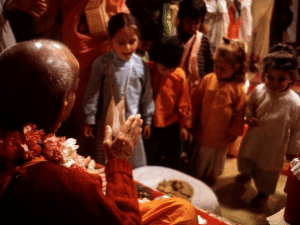"As man wonderfully manipulates the material elements to make airplanes,"
The temple in Honolulu was small and crowded, and so the devotees had arranged for Srila Prabhupada to stay in a skyscraper hotel near the main downtown beach area. He didn't seem to mind, although the main lobby was filled with tourists and we had to ride up about twenty floors in the elevator. The apartment had one large living room with an adjoining bedroom for Srila Prabhupada's use. There was also a small dining room and kitchen that could be separated from the other rooms by a folding door, and Panditji and I stayed there. There wasn't much privacy for Prabhupada; if we made any noise he would hear us. But he had a great view of the ocean and sky. There was no desk, so he sat on the couch and we placed his dictaphone and books on a low glass table in front of him. Whatever the nondevotees build and arrange, even if expensively done, is never ideal for use in pure devotional service, yet Srila Prabhupada was always able to make do with whatever was provided. He had said all he really needed was a quiet, clean room, a little prasadam, and some opportunity to preach to people. He certainly wasn't interested in using the populated hotel beach, the pool, the nightclub, or the meat-and-liquor restaurant. Looking down to the beach far below, we could see the bathers and surfers. Srila Prabhupada remarked that they were wasting their time?coming to Hawaii to jump like monkeys, although human life was intended for self-realization. But Prabhupada liked the breezes and the sunshine.
The temple was almost an hour away and so we left the hotel before dawn, while the sky was still dark. Hawaiian singing and guitar music were piped into the elevator, and Sudama, the Honolulu temple president, remarked to Prabhupada that Hawaiians were famous as melodic singers. Srila Prabhupada acknowledged Sudama's remark but commented that Bengalis were also famous as melodic singers.
In the lobby American tourists?mostly elderly and carrying cameras, the men wearing Bermuda shorts and Hawaiian shirts?were moving about, getting taxis or walking to the beach. On the road, as far into the distance as the eye could see, a line of cars with headlights shining approached the city.
"This is the best part of the morning for spiritual life," Srila Prabhupada said unhappily, "and they are all up for sense gratification and for going to work"
The sun had not yet risen when we reached Waikiki Beach for Prabhupada's walk, but there too, surfers and fishermen were already in the water. "They have gotten up so early just to kill the fish," Prabhupada said. And, referring to the surfers, he remarked, "It is a suffering for them to enter the water so early, but for this they will do it."
About half a dozen devotees joined us in a park by the ocean, and we walked behind Prabhupada, who went briskly, marking the ground with his varnished, bamboo-textured cane, holding his head high. The devotees had brought him a wonderful garland of freshly-picked magnolia and pikake flowers, and he accepted it around his neck with pleasure. He also seemed to enjoy the nice ocean breezes. His shiny saffron silk clothes looked very elegant on his body, and his thickly crocheted white scarf, which he had asked me for at the beginning of the walk, was draped loosely around his shoulders.
When one of the devotees mentioned that the government had cut all the coconuts from the tall palm trees out of fear that they might fall and hurt someone, Srila Prabhupada scoffed that this was ridiculous. "In India," he said, "there are many coconut trees, and there is no instance of anyone being hit on the head. Krishna knows when to drop the coconut so no one is underneath. This is a demoniac government, the tree loses its beauty when the fruits are taken off, just as a woman without children loses her beauty."
As other people out strolling approached us, Prabhupada often greeted them by saying, "Good morning." After several greetings he stopped and asked us, "What is the meaning of saying, ?Good morning'?"
"It is a kind of friendly exchange," I said.
"It is a way of wishing each other good," said Sudama.
"No," said Prabhupada. "The real thing is that in England, it is rarely a sunny morning. So when finally there is sun, people say, ?Good morning' Similarly, in the material world there is always darkness, and that dark cloud is the desire of the living entity to be master."
As the sky lightened, we saw distant mountains and a nearby skyline of tall hotel and apartment buildings. Many small fishing and tour boats were in the harbor, and directly overhead large jets, both arriving and departing, flew over the island.
"As man wonderfully manipulates the material elements to make airplanes," said Prabhupada, "there must also be a Supreme Being who has made the material universe. A plane, for example, is not created accidentally or automatically. It is produced and piloted by man. Similarly, God creates and controls the material universe. But the atheists deny God by saying that nature works on its own. They have lost their intelligence."
Speaking for the opposition, I gave what I thought was a feasible argument.
"Prabhupada, the atheists believe that they can control nature, and therefore there is no need for God. After all, they are able to fly their planes. " I gestured to the 747 jet overhead as evidence of man's power to control.
"They have some control," Prabhupada replied, "but some control means no control. They are unable to control death, birth, disease and old age. So what is the value of some control?"
Reference: Life with the perfect master - A personal servants account by Satsvarupa Das Goswami
Recently Added
Trending Today
